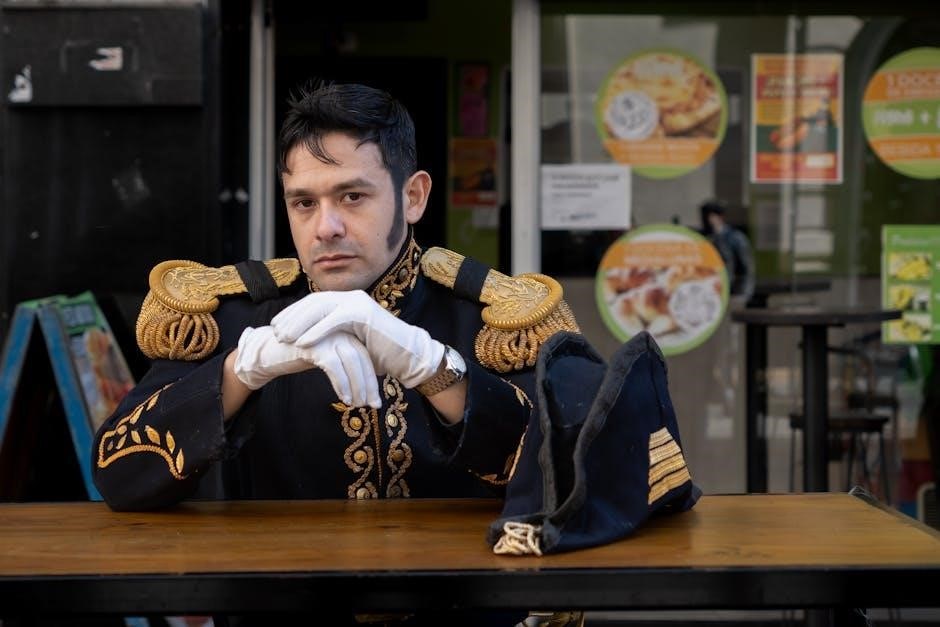Romeo and Juliet, a timeless tale of tragic love, explores the feud between two families and the passionate journey of its titular characters, shaping Shakespearean drama.
1.1 Overview of the Play and Its Significance
Romeo and Juliet, a cornerstone of English literature, explores themes of love, fate, and conflict through its tragic narrative. Set in Verona, the play revolves around the feud between the Montagues and Capulets, with Romeo and Juliet at the center, whose love ultimately leads to devastating consequences. This timeless tale, written by William Shakespeare, remains a profound exploration of human emotions and societal divisions. Its enduring significance lies in its universal themes, which continue to resonate with audiences today. The play’s tragic ending underscores the destructive nature of unchecked hatred and impulsive decisions;
1.2 Importance of Character Analysis in Understanding the Play
Character analysis is crucial for understanding the dynamics of Romeo and Juliet, as the play’s themes and tragic outcomes are deeply rooted in the personalities and interactions of its characters. By examining Romeo’s impulsiveness, Juliet’s resilience, and the manipulative nature of figures like the Nurse, audiences gain insight into the motivations driving the plot. Understanding these characters’ emotional journeys and relationships reveals the interplay of fate and free will, as well as the societal pressures that shape their choices. This analysis enriches the appreciation of Shakespeare’s exploration of love, conflict, and human frailty.
Romeo Montague
Romeo, a passionate and impulsive young noble, embodies sensitivity and idealism, driving his tragic pursuit of love and destiny amidst Verona’s familial conflict.
2.1 Romeo’s Personality Traits: Passion, Impulsiveness, and Sensitivity
Romeo’s personality is defined by his intense passion, which drives his love for both Rosaline and Juliet. His impulsiveness leads to rash decisions, such as his secret marriage to Juliet and his deadly confrontation with Tybalt. Romeo’s sensitivity is evident in his poetic nature and emotional depth, as he often expresses his feelings profoundly. His tragic flaw lies in his inability to balance passion with reason, leading to impulsive actions that sealed his fate. These traits make Romeo a complex and relatable character, embodying both the beauty and destructiveness of unyielding emotion.
2.2 Romeo as a Tragic Hero: His Role in the Play
Romeo embodies the archetype of a tragic hero, possessing noble qualities and a fatal flaw. His unwavering loyalty to Juliet and his family underscores his nobility, while his impulsive decisions act as his downfall. Through his journey, Romeo’s tragic heroism highlights the devastating consequences of the feud and the redemptive power of love. His ultimate sacrifice, alongside Juliet, serves as the catalyst for peace between the Montagues and Capulets, cementing his role as a pivotal figure in the play’s resolution and enduring legacy as a tragic hero.
2.3 Romeo’s Relationships: Family, Friends, and Juliet
Romeo’s relationships shape his identity and drive the play’s narrative. His bond with his family, particularly Lord and Lady Montague, reflects their concern for his well-being and his rebellious nature. His friendships, especially with Mercutio and Benvolio, highlight his loyalty and camaraderie. However, his all-consuming love for Juliet defines his character, leading to both profound joy and tragic consequences. These relationships illustrate Romeo’s emotional depth, his capacity for love and loyalty, and ultimately, his willingness to sacrifice everything for those he cares about, making him a complex and relatable figure in the play.
Juliet Capulet
Juliet, the young daughter of Lord and Lady Capulet, is a innocent yet decisive character whose tragic love for Romeo drives the play’s emotional core and ultimate sorrow.
3.1 Juliet’s Personality: Innocence, Decisiveness, and Inner Strength
Juliet embodies a mix of innocence and decisiveness, evolving from a naive girl to a mature woman. Her inner strength shines as she defies societal norms, showcasing bravery and independence. Despite her youth, Juliet displays emotional depth, balancing vulnerability with resolute decisions. Her love for Romeo highlights her passion and willingness to risk everything for true connection. This duality of traits makes Juliet a compelling and relatable character, driving the play’s emotional core and tragic outcome.
3.2 Juliet’s Growth from Adolescence to Maturity
Juliet’s transformation from adolescence to maturity is a central theme in the play. Initially, she appears as an innocent, obedient teenager, but her experiences with love and conflict reveal her inner strength. Her decision to marry Romeo and defy her parents showcases her growing independence and determination. As the play progresses, Juliet faces challenges with courage, demonstrating a maturity beyond her years. Her ultimate sacrifice underscores her emotional growth, transforming her from a naive girl into a tragic heroine who takes control of her destiny, despite the devastating consequences.
3.3 Juliet’s Tragic Fate and Its Impact on the Play
Juliet’s tragic fate serves as the emotional core of the play, symbolizing the devastating consequences of impulsive decisions and an unrelenting family feud. Her death, alongside Romeo’s, underscores the senselessness of their families’ hatred and the inevitability of fate. Juliet’s ultimate sacrifice not only deepens the tragedy but also brings a poignant resolution, as her loss unites the feuding families in grief. Her tragic end highlights the destructive power of fate and the enduring impact of her love story, leaving a lasting impression on the audience and the play’s themes.

The Nurse
The Nurse is Juliet’s loyal caregiver, offering wisdom, humor, and emotional support. Her deep affection for Juliet creates conflict when she struggles with the family feud.
4.1 The Nurse’s Role in Juliet’s Life
The Nurse serves as Juliet’s primary caregiver and confidante, providing maternal affection and guidance. She shares humorous anecdotes and offers practical advice, fostering Juliet’s independence and emotional growth. Her deep bond with Juliet creates a trusted relationship, allowing Juliet to express her true feelings. The Nurse’s loyalty and wisdom are central to Juliet’s development, making her a pivotal figure in Juliet’s journey from adolescence to maturity.
4.2 The Nurse’s Loyalty and Conflict
The Nurse’s unwavering loyalty to Juliet is evident in her protective and nurturing nature. However, her deep affection for Juliet leads to internal conflict when she betrays her trust by supporting Paris’s proposal. This decision, driven by a desire for Juliet’s security, creates tension and ultimately contributes to the tragic outcome. The Nurse’s loyalty is tested as she struggles between her duty to the Capulets and her love for Juliet, highlighting her complex and emotionally conflicted character.
4.3 The Nurse’s Humor and Wisdom
The Nurse’s humor and wisdom provide comic relief while offering insight into her character. Her bawdy jokes and lively storytelling endear her to Juliet, showcasing a playful yet practical nature. Despite her comedic moments, the Nurse imparts wisdom through her life experiences, serving as a maternal figure. Her humor often masks a deeper understanding of love and life, making her a well-rounded and memorable character. The Nurse’s ability to blend humor with wisdom highlights her significance in Juliet’s life and the play’s dynamic narrative.

Friar Laurence
Friar Laurence, a wise Franciscan friar, serves as a mentor to Romeo and Juliet, offering spiritual guidance and devising plans to end their families’ feud, driven by good intentions.
5.1 Friar Laurence’s Wisdom and Good Intentions
Friar Laurence, a wise and compassionate mentor, consistently demonstrates good intentions through his actions. He believes in the power of love to heal the feud between Montagues and Capulets. His wisdom is evident in his role as a spiritual advisor, offering guidance to both Romeo and Juliet. With a deep understanding of human nature, he devises plans to unite the lovers, showcasing his belief in the redemptive power of love. His intentions, though well-meaning, ultimately lead to tragic consequences, highlighting the complexity of his character and the unpredictable nature of fate.
5.2 Friar Laurence’s Role in the Tragic Ending
Friar Laurence’s well-intentioned plans inadvertently contribute to the tragic conclusion of the play. His decision to marry Romeo and Juliet in secret, though meant to end the feud, escalates the conflict. The friar’s scheme to use a potion to make Juliet appear dead, while innovative, ultimately fails due to miscommunication and impulsive actions by the characters. His miscalculations, such as the delayed delivery of his letter to Romeo, directly lead to the tragic suicides. Despite his wisdom, Friar Laurence’s inability to foresee the consequences of his actions makes him a pivotal, yet tragic, figure in the play’s devastating outcome.
5.3 Friar Laurence’s Relationship with Romeo and Juliet
Friar Laurence acts as a mentor and confidant to both Romeo and Juliet, offering guidance and support throughout the play. He marries the lovers in secret, hoping to end the feud between their families. His wisdom and belief in the power of love drive his decisions, yet his plans often lead to unintended consequences. Friar Laurence’s relationship with Romeo and Juliet is rooted in his desire to help them, but his inability to fully grasp the depth of their impulsiveness contributes to the tragic outcome. His emotional investment in their union underscores his complex role in their lives.

Tybalt
Tybalt, a volatile and aggressive Capulet, drives the feud with his deep hatred for Montagues. His actions escalate the conflict, leading to tragic consequences in Verona.
6.1 Tybalt’s Aggressive and Vengeful Nature
Tybalt’s character is defined by his intense aggression and desire for revenge, particularly against the Montagues. His fiery temper and hatred fuel the ongoing feud, making him a volatile antagonist. Tybalt’s actions are driven by a deep-seated need to uphold family honor, which often leads him to seek confrontation. His impulsive nature escalates tensions, contributing to the tragic events of the play. Tybalt’s vengeful attitude not only endangers others but also ultimately seals his own fate, highlighting the destructive power of unchecked rage and vendetta.
6.2 Tybalt’s Role in Escalating the Feud
Tybalt’s aggressive nature significantly escalates the feud between the Montagues and Capulets. His hatred for the Montagues drives him to provoke conflict, most notably in his duel with Mercutio. Tybalt’s refusal to back down and his eagerness to fight reflect his deep-seated animosity. His actions lead to Mercutio’s death, which in turn prompts Romeo to kill Tybalt, resulting in Romeo’s banishment. This chain of events intensifies the families’ hostility, making reconciliation impossible. Tybalt’s role as an instigator highlights how individual actions can perpetuate and worsen long-standing conflicts, ultimately contributing to the tragic outcome of the play.
6;3 Tybalt’s Impact on the Plot
Tybalt’s actions significantly advance the plot of Romeo and Juliet, fueling the tragic sequence of events. His deadly duel with Mercutio provokes Romeo’s retaliation, leading to Tybalt’s death and Romeo’s banishment. This escalation intensifies the families’ animosity and creates a ripple effect, sealing the fate of the lovers. Tybalt’s vendetta-driven behavior not only heightens tension but also accelerates the play’s tragic conclusion, making him a pivotal figure in the narrative’s progression and the ultimate downfall of the protagonists.

Lord and Lady Capulet
Lord and Lady Capulet are central figures in Juliet’s life, shaping her destiny through their authoritative rule and familial expectations, while fueling the deadly feud with the Montagues.
7.1 Lord Capulet’s Authoritative and Strict Personality
Lord Capulet is portrayed as a strong, authoritative figure who demands obedience from his family. His strict personality is evident in his insistence on Juliet marrying Paris, reflecting societal norms. Capulet’s decisions are often impulsive and driven by a desire to uphold family honor. Despite his harsh exterior, he shows moments of tenderness, revealing a complex character. His authoritative nature escalates tensions, contributing to the tragic outcome of the play. Capulet’s strictness underscores the societal pressures of the time, emphasizing duty over personal desire. His actions significantly impact Juliet’s fate, highlighting the consequences of unchecked authority.
7.2 Lady Capulet’s Role in Juliet’s Life
Lady Capulet plays a significant but often distant role in Juliet’s life. As Juliet’s mother, she is aligned with her husband’s authority, emphasizing obedience and societal expectations. Her relationship with Juliet is formal, leaving emotional support to the Nurse. Lady Capulet’s primary focus is on securing Juliet’s marriage to Paris, reflecting her adherence to family honor and tradition. When Juliet resists, Lady Capulet supports Lord Capulet’s harsh decisions, prioritizing loyalty to her husband over her daughter’s well-being. This dynamic highlights the societal pressures on women and the strained mother-daughter bond, contributing to Juliet’s emotional isolation and reliance on others. Her actions underscore the rigid gender roles of the time.
7.3 The Capulets’ Contribution to the Family Feud
The Capulets, particularly Lord and Lady Capulet, actively perpetuate the bitter rivalry with the Montagues. Their rigid adherence to family honor and tradition fuels the conflict, as they refuse to consider peace or compromise. Lord Capulet’s authoritative nature and Lady Capulet’s support for their daughter’s arranged marriage to Paris escalate tensions. The family’s approval of Tybalt’s aggressive behavior toward the Montagues further intensifies the feud. Their insistence on maintaining societal expectations and familial pride ultimately contributes to the tragic outcome, as their actions isolate Juliet and drive the conflict to its devastating conclusion.
Lord and Lady Montague
Lord Montague shows deep concern for Romeo, while Lady Montague struggles with emotional turmoil. Their perspectives on the feud highlight their parental care and family loyalty.
8.1 Lord Montague’s Concern for Romeo
Lord Montague, as Romeo’s father, exhibits a paternal concern for his son’s well-being. He is aware of Romeo’s emotional turmoil and expresses worry about his son’s mysterious behavior. While maintaining his authoritative role, Lord Montague shows a genuine interest in Romeo’s happiness, reflecting the tension between parental care and the societal expectations of their family feud. His character highlights the complexities of fatherhood in a conflict-ridden society, adding depth to the play’s exploration of family dynamics and personal struggles.
8.2 Lady Montague’s Emotional State
Lady Montague’s emotional state is deeply strained by the familial conflict and her son Romeo’s mysterious behavior. She expresses concern for Romeo’s well-being, fearing the consequences of his impulsive actions. Her anxiety reflects the broader tension within the Montague household, as she struggles to balance her maternal instincts with the societal pressures of the feud. Lady Montague’s emotional turmoil adds depth to the play, highlighting the personal costs of the ongoing rivalry and the helplessness of parents in guiding their children through turmoil. Her character underscores the human dimension of the conflict.
8.3 The Montagues’ Perspective on the Feud
The Montagues view the feud with the Capulets as a deeply ingrained rivalry, rooted in pride and honor. They seek to protect their family’s reputation while navigating the escalating tensions. Lord Montague, though authoritative, shows concern for Romeo, recognizing the emotional toll the conflict takes. The Montagues’ perspective emphasizes the cyclical nature of the feud, where revenge and loyalty are paramount. Their actions, though often reactive, stem from a desire to maintain dignity and stability, highlighting the tragic inevitability of the conflict’s continuation and its devastating impact on their son.

Mercutio
Mercutio is Romeo’s loyal friend, known for his vibrant personality, witty humor, and boldness. His tragic death accelerates the play’s devastating chain of events, deeply affecting Romeo.
9.1 Mercutio’s Loyal Friendship with Romeo
Mercutio’s unwavering loyalty to Romeo is a cornerstone of their friendship. Despite his own tragic fate, Mercutio consistently offers support and camaraderie, showcasing a deep emotional bond with Romeo. His vibrant personality and quick wit provide contrast to Romeo’s romantic melancholy, while his boldness often shields Romeo from harm. Mercutio’s death serves as a catalyst for Romeo’s vengeful actions, highlighting the profound impact of their friendship on the play’s progression. This loyalty not only enriches their relationship but also underscores the tragic consequences of their intertwined fates.
9.2 Mercutio’s Witty and Vibrant Personality

Mercutio’s vibrant personality shines through his sharp wit, humor, and lively demeanor, making him a dynamic character in the play. His ability to craft clever puns and engage in playful banter adds comedic relief, contrasting the tragic undertones of the story. Mercutio’s humor often serves as a foil to Romeo’s romantic melancholy, highlighting their differing perspectives. His bold and confident nature makes him a compelling figure, while his loyalty to Romeo underscores his depth. Mercutio’s death profoundly impacts the play’s tone, transitioning it from lighthearted moments to a darker, more tragic trajectory.
9.3 Mercutio’s Death and Its Significance
Mercutio’s death marks a turning point in the play, escalating the feud and intensifying the tragic momentum. His fatal stabbing by Tybalt, coupled with Romeo’s impulsive revenge, leads to Romeo’s banishment. Mercutio’s demise removes a key source of humor and camaraderie, plunging the story into darker tones. His death underscores the senseless violence of the feud and highlights Romeo’s emotional turmoil. Mercutio’s final words, blaming fate, foreshadow the inevitable tragic conclusion, making his death a pivotal moment in the play’s progression toward devastating loss.
Paris

Paris, Juliet’s arranged suitor, embodies kindness and obligation. His tragic death in the tomb underscores the devastating consequences of the feud, adding depth to the play’s sorrow.
10.1 Paris as Juliet’s Suitor
Paris is portrayed as a kind and dutiful suitor chosen by Juliet’s parents for marriage. Despite his genuine affection, Juliet’s heart belongs to Romeo, leading to tragic consequences. Paris represents societal expectations of marriage, highlighting the conflict between duty and love. His character serves to contrast Romeo’s passionate love, emphasizing Juliet’s internal struggle. Ultimately, Paris’s death in the tomb alongside Juliet and Romeo underscores the devastating cost of the feud and the impossibility of forced unions in a world governed by love and hate.
10.2 Paris’s Character: Kindness and Obligation
Paris is depicted as a kind and courteous suitor, genuinely caring for Juliet’s well-being. He believes in fulfilling his obligations, especially to Juliet’s family, showcasing his sense of duty. Paris’s character highlights the societal norms of arranged marriages, where personal feelings are often secondary to family expectations. His kindness contrasts sharply with the intensity of Romeo and Juliet’s love, emphasizing the tragic inevitability of their fate; Paris’s role underscores the tension between obligation and passion, while his genuine intent makes him a sympathetic, though ultimately doomed, figure in the play.
10.3 Paris’s Tragic End and Its Implications
Paris’s tragic end occurs in the tomb where Juliet lies, as he confronts Romeo and is fatally wounded in their duel. His death serves as a poignant reminder of the senseless violence fueled by the feud between the Montagues and Capulets. Paris’s demise underscores the devastating consequences of impulsive actions and the destructive nature of the families’ hatred. His death, alongside Romeo and Juliet, amplifies the play’s tragic climax, highlighting the futility of their sacrifices and the enduring impact of their losses on Verona.

Prince Escalus
Prince Escalus, the ruler of Verona, serves as a peacemaker, striving to end the bitter feud between the Montagues and Capulets, while maintaining order in the city.
11.1 Prince Escalus’s Role as a Peacemaker
Prince Escalus plays a pivotal role as Verona’s peacemaker, striving to end the Montague-Capulet feud. His authority is evident as he intervenes in public disputes, enforcing decrees to maintain order. Escalus’s concern for civic peace drives his decisions, yet his efforts are often undermined by the families’ deep-rooted animosity. Despite his firm actions, such as banishing Romeo, he remains a fair ruler, aiming to protect Verona from chaos. His inability to end the feud highlights the entrenched hatred, ultimately contributing to the tragic outcome of the story.
11.2 Prince Escalus’s Authority and Decisions
Prince Escalus wields significant authority as Verona’s ruler, striving to maintain peace and order. His decrees, such as banishing Romeo, reflect his commitment to justice and control over the feuding families. Escalus’s decisions are firm yet fair, aiming to prevent further bloodshed and restore stability. However, his authority is often challenged by the families’ relentless hatred, limiting the effectiveness of his rulings. His role underscores the struggle between civic order and personal vendettas, ultimately highlighting the futility of his efforts to end the conflict that drives the tragic events of the play.

11.3 Prince Escalus’s Reaction to the Tragedy
Prince Escalus is deeply grieved by the tragic outcome of Romeo and Juliet’s deaths. He recognizes the senseless destruction caused by the feud and mourns the loss of young lives. Escalus acknowledges his own inability to prevent the tragedy, showcasing his regret and helplessness. His sorrow is compounded by the realization that the families’ hatred has led to such devastating consequences. The tragedy serves as a stark reminder of the futility of their vendetta, and Escalus’s reaction underscores the play’s theme of irreversible loss and the enduring impact of unresolved conflicts.
The Theme of Fate in Character Development
Fate significantly influences Romeo and Juliet’s decisions, shaping their personalities and leading to tragic outcomes. It also impacts other characters, highlighting the inevitability of destiny.
12.1 How Fate Influences Romeo and Juliet’s Actions
Fate plays a central role in shaping Romeo and Juliet’s actions, as their belief in destiny drives their decisions. Romeo’s impulsive nature, evident in his “Direct my sails” declaration, reflects his trust in fate. Similarly, Juliet’s inner strength and resolve are influenced by her acceptance of fate, as seen in her willingness to defy societal norms. Their actions, from their initial meeting to their tragic ending, are often portrayed as inevitable, highlighting the idea that their lives are guided by forces beyond their control. This belief in fate underscores their tragic journey and the play’s exploration of destiny.
12.2 Fate’s Impact on Other Characters
Fate significantly influences other characters in Romeo and Juliet, shaping their actions and destinies. Friar Laurence, driven by good intentions, unwittingly accelerates the tragic outcome through his plans. The Nurse, bound by loyalty, faces emotional turmoil as she witnesses the doomed love story. Tybalt’s aggressive nature and Mercutio’s vibrant personality are both governed by fate, leading to their fatal confrontation. Even Paris, Juliet’s suitor, falls victim to fate, meeting a tragic end. Fate’s pervasive influence ties all characters together, illustrating how their lives are intertwined and destined for sorrow, ultimately emphasizing the play’s tragic essence and universal themes of destiny.
12.3 The Interplay of Fate and Free Will
The interplay of fate and free will in Romeo and Juliet is central to the play’s tragic outcome. While fate sets the stage with the feud and unforeseen events, characters’ choices amplify the tragedy. Romeo’s impulsive decisions and Juliet’s defiance of her parents exemplify free will, yet fate orchestrates their ultimate demise. This duality highlights Shakespeare’s exploration of human agency versus destiny, suggesting that while choices matter, fate’s influence is inescapable. The tension between these forces underscores the play’s themes of inevitability and the human condition, making the tragic conclusion both poignant and thought-provoking.